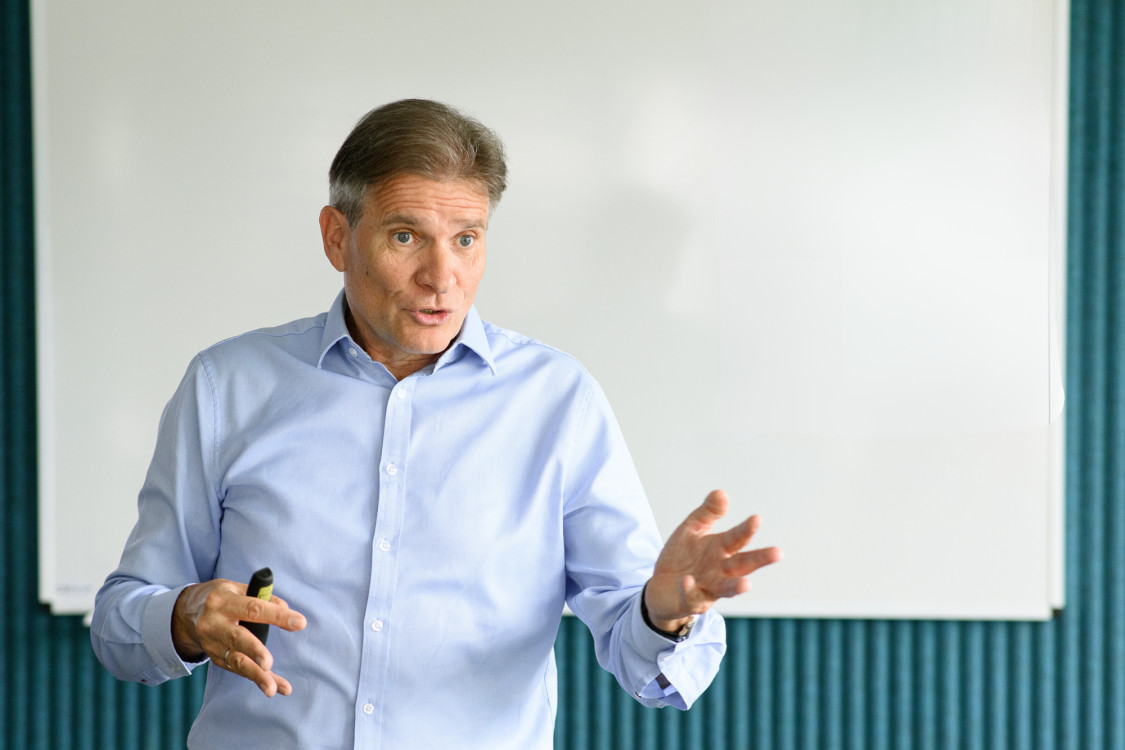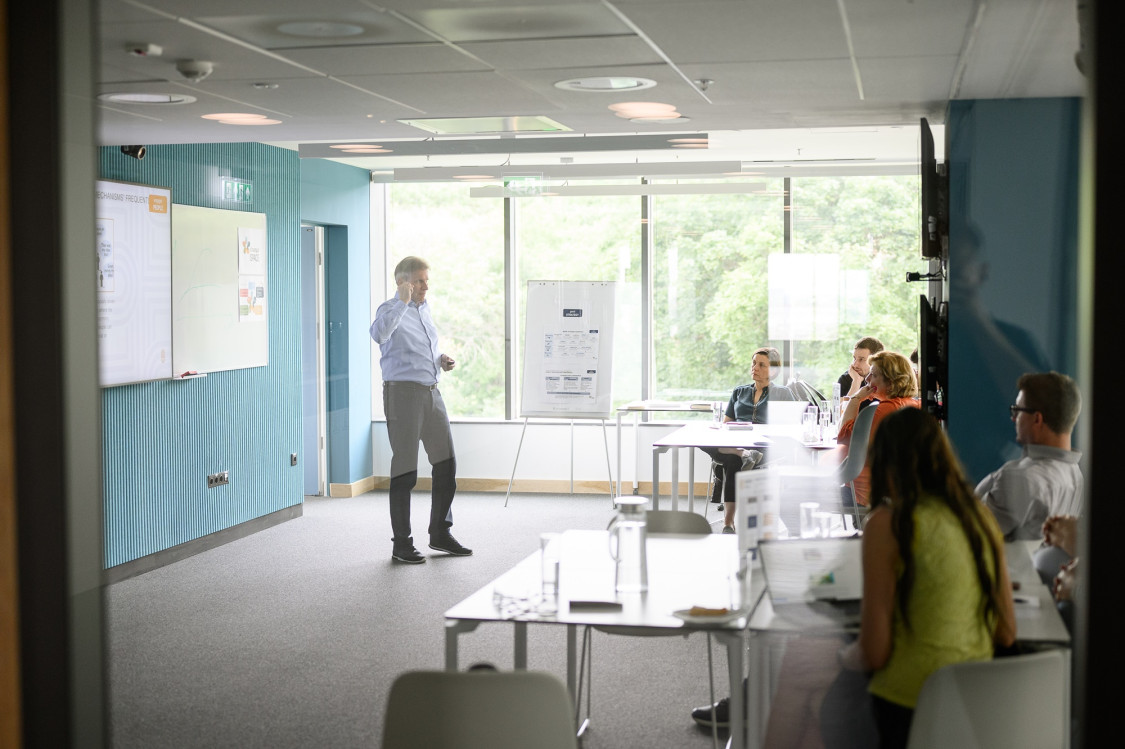15 November 2024
SEED Executive School was recently featured on Portfolio.hu in an article discussing the evolving challenges for CEOs in the face of rapid technological advancements. The article is based on an interview with György Leitner, SEED’s Business Director, and includes perspectives from the mentors of the Advanced Leadership Program: Dr. Ágnes Fábián (Managing Director, Henkel Hungary) and Thomas Narbeshuber (Head of Central & South-East Europe, BASF). They share their insights on how leaders can effectively navigate digital transformation and innovation as well as finding personal balance.
The article was originally published by Portfolio.hu in Hungarian, which you can read here.
For our international audience, we have translated the article, that can be read below.
The constantly changing economic environment and market competition can often cause uncertainty and difficulties in the strategic planning of companies. Today, firms need not only to identify market opportunities, but also to be able to take advantage of technology, come up with innovative solutions and manage their resources efficiently. With all this in mind, how can today’s top managers balance the short and long-term strategy of their company? How can leadership skills be adapted to environmental change, what is necessary for top management to play its role effectively?
The increasingly complex business environment also poses new challenges for business leaders, as in addition to the complexity of their own business processes, they must also address issues such as data protection or sustainability, which are sensitive areas due to constantly changing EU and national regulations. Adding to the unpredictability is the emergence of artificial intelligence, automation, robotisation and other exponential technologies that are fundamentally rewriting the way business is done, as well as the decision-making processes.
There is almost no industry or type of business where these changes do not occur, whether small or family-owned, the use of innovative technology will eventually play an important role in the life of every company. Senior managers need to synthesise opportunities in this ever-changing environment. Whereas in the past, managers were mainly concerned with the interests and expectations of shareholders and owners, today the circle of stakeholders has expanded considerably, and
MANAGERS MUST RESPOND TO NEW CHALLENGES, SUCH AS THE ENVIRONMENTAL IMPACT OF COMPANY OR THE PROPORTION OF WOMEN MANAGERS.
“A new mindset and new leadership skills are needed, as it is much more effective for senior managers to work as part of a team to drive processes and make their company successful through other managers. This also means a change in the way senior managers operate, in their character and profile” György Leitner, Business Director of SEED Executive School, told Portfolio.
Do CEOs recognise that they need to change?
As much of the change is technological, there are often questions about how well managers can keep up with new technologies, but this is not necessarily a question of age. In many cases, it is the CEO within the organisation who is the barrier to the business taking advantage of these benefits. In addition, according to the former head of large healthcare and pharmaceutical companies, companies are not prepared for technological change, and are typically still at the beginning of their digital transformation. Just because they are digitalising previously analogue data and processes does not mean that they can tick off digitisation, because it is only the beginning.
“It is also a typical case when the use of different digital platforms has to be standardised during an acquisition, and the integration of these platforms can often take years” said György Leitner. He added that now almost all companies can be considered software companies, regardless of sector, but many are still just chasing processes.
The understanding and application of AI in businesses is in its infancy
The return on investment for the introduction and use of innovative technologies can take several years, so companies tend to put off these developments and often set themselves other priorities in the short term. In order to achieve short-term goals, they tend to push long-term goals into the background, since in a large company different investment opportunities compete with each other, and the return on investment is often the key.
According to György Leitner, we should consider not only the application of artificial intelligence, but there should be a fundamental change in the approach, which top management either has or does not have. However, it is important for them to see it, that
DIGITAL TRANSFORMATION HAS THE POTENTIAL TO MAKE THEIR BUSINESS PROCESSES MORE EFFECTIVE, TO HELP RATIONALIZE COSTS AND, LAST BUT NOT LEAST, TO HELP THEM CATER TO CUSTOMER NEEDS MORE EFFECTIVELY.
“Business leaders are not yet so conscious of this area, they don’t realise the competitive advantage it offers. It’s a big contradiction, because although everyone talks about AI, it’s still relatively underused in practice.“
The level of employee engagement is alarmingly lowAlthough it is one of the most important factors for competitiveness, international research shows that globally nearly 80% of workers are not engaged at their workplace and 50% are in a state of “silent exit”. Thomas Narbeshuber, BASF’s Regional Managing Director for Central and Southern Europe, sees changing this as one of the most important goals and challenges, as he points out that successful companies can achieve up to 70% engagement. As a faculty and mentor of SEED’s Advanced Leadership Program, he supports the participants in this aspect as well. |
Globally, top managers typically spend 8 years in their position, which shows that a few years are not enough to achieve results. However, international research has shown that an increasing number of top leaders are not in their position for more than 2 years, with the current rate hovering around 15%. “It is difficult to align the short-term expectations of owners with longer-term investments. However, it is also legitimate for owners to expect to see the impact of a top manager in the short term. This can lead to significant organizational and business model changes in the first year or two, but very often they are not successful” said György Leitner.
In order to minimise risk, appointments to top positions are increasingly being made from within the organisation, as it is faster and usually cheaper. Some say that for a top manager to come from outside the organisation, they have to be at least 30% better than an internal candidate, which is not a small difference.
With so many demands to meet, where should managers turn?
Today’s business leaders must therefore not only represent the interests of their owners, but also meet the expectations of the wider environment, and this requires developing leadership skills to adapt to these changing expectations, in order to be more successful in the long term, stay in their positions longer and thus make their companies more successful.
CONTINUOUS LEARNING IS A PREREQUISITE FOR BUSINESS SUCCESS AT ALL LEVELS, BUT AT THE LEVEL OF TOP MANAGEMENT THERE IS OFTEN LITTLE ENERGY LEFT FOR THIS.
“Habits can be broken, but it is necessary for leaders to spend time focusing on themselves and their team. This requires a new methodology and priorities, which is where SEED’s unique approach of focusing on hands-on practice comes in” said the Business Director of SEED Executive School.
What makes a leader credible to their wider and smaller community? Apart from professional skills, it is also about personality and perspective. Today, it is the service of the team rather than authority that must become the guiding force. In addition, the ability to change and to drive this through the whole organisation is increasingly valued in an ever-changing economic environment. In transformation, the ability to change needs to be developed as an organisational capability by the leader. Strengthening all these skills is part of the new Advanced Leadership Program.
The leader is only able to help if they are in balanceCreating not only profitability but also stable, sustainable operations is a top priority for business leaders: a key skill nowadays, given the Covid era and the various crises and constant changes. Ágnes Fábián, Managing Director of Henkel Hungary, believes in the development of a well balanced managerial and team level operation, both in her own company and as a mentor and faculty of SEED’s top management program. In her experience, top managers have to consciously strive to maintain their own personal balance in the face of constant change, because that is when they can play a decisive and exemplary role in the life of the company. Any training and development that aims not only to improve professional skills, but also to develop a corporate culture, new attitudes and personal skills, is a great help in this respect. |
The unpredictable and complex environment also challenges strategy making. In the past, strategic planning was based on a fixed 3-5 year period, but today planning cycles need to be significantly shortened, with many more iterations needing to be built into day-to-day operations.
To operate successfully, you need partners
There are many stakeholders that you may not think of at first, such as family. György Leitner said that it is important to highlight that a leader’s job also has an impact on his or her personal and family environment, which requires special attention. The success of these relationships can also translate into business results, so the family should also be considered among the stakeholders.
Managers seek to connect with others in similar situations, as they often feel lonely because of their position, which in turn says a lot about the level of interaction within the team or company. If someone feels that way, it can also mean that colleagues are afraid to open up and give feedback, that the company culture is not right, that there is
NO DIALOGUE IN THE ORGANIZATION, THERE IS A ONE-DIRECTIONAL, TOP-DOWN COMMUNICATION, THAT CAN HAVE A DIRECT IMPACT ON THE BUSINESS PROCESSES.
The Business Director explained that SEED’s Advanced Leadership Program for international and local top executives takes three times three days over a 7-month period, as part of the methodology is that participants do not learn new knowledge and methods all at once, but over a longer period of time to allow them to apply them in practice. During this time, participants will also receive mentoring and coaching support and have the opportunity to interact with managers from different sectors. The program will feature a number of invited top leaders who will talk about their own experiences on a particular topic.

